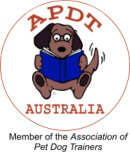We all too often don’t see the signs our dogs give that indicates that they are anxious. In fact we quite often misinterpret them and label them aggressive, destructive or disobedient.
In order for us to see those signs we need to understand dogs a bit better. We need to learn how to read our dogs.
As Kerry Haynes-Lovell previously a dolphin trainer from Seaworld says “It’s their story”.
| Anxious dogs can show their anxiety in a number of ways. | |
| Aggression towards people and other dogs | |
| Ignoring or avoiding people and other dogs | |
| Barking | |
| Destructive behaviour | |
| There are some signs that are very subtle which can indicate a dog is not comfortable with a situation. | |
| Licking their nose (when they haven’t just eaten) | |
| Yawning | |
| Sniffing the ground | |
| Looking away | |
| Avoiding eye contact | |
| This all has to be taken in context of the situation. | |
| There are other signs that are a lot more obvious. | |
| Ears flat | |
| Tail between legs | |
| Eyes wide and the whites showing | |
| Growling | |
| Baring teeth | |
| Body is lower to the ground | |
| Shaking | |
| Body is rigid | |
| Our reaction to our dogs when we see these behaviours can have a positive or adverse effect on how they behave in the future. To understand this we need to understand how dogs learn. | |
How Dog’s Learn
It’s all about action and consequence. If a dog is rewarded for completing an action such as sit, then he is more likely to sit again when asked. If he is not rewarded then he is less likely to sit when asked next time. If he is chastised for sitting then he is even less likely to sit next time and is even more likely to run in the other direction when asked again. (Who ever said dogs are dumb).
Dogs will also act on cues and you will find that dogs don’t just go by one cue but a whole bunch of cues i.e., when we ask them to sit it’s not just the command but where we are (e.g. garden), how we are standing (e.g. standing facing them), our facial expressions and our hand signal if we use one.
Can Our Response To Our Dog Impact Their Response?
The answer is definitely. In our efforts to be responsible dog owners we sometimes inadvertently make the behaviour worse by how we react to our dogs when they are anxious. E.g. Fido barks at another dog and we tell Fido off usually by saying “No!” and we may even jerk on the lead to emphasize we are not happy with Fido. Unfortunately if this happens every time that Fido sees another dog, Fido starts to believe that the reprimand and jerk on the lead is because the other dog is there. So Fido thinks I don’t want other dogs near me so every time I see one, I’m going to growl as well as bark and maybe even lunge as well. Pretty soon we have a dog that is aggressive towards other dogs. Please remember Fido started off as an anxious dog, but now he is trying very hard to make the other dog go away as he believes that the dogs presence is why he is be punished.
How do we prevent our dogs from becoming anxious ?
First we need to watch our dog’s body language and read the signals they are giving you. Always reward calm behaviour in what can be stressful situations for your dog. E.g. Thunderstorms, lawn mowers.
Second if they display anxious behaviour we need to remove our dog from the situation. As we are removing our dog from the situation we need to talk to our dog in a voice that is calm and neutral. If your dog wants to retreat to a safer place then let them. Please do not force them into a situation they are anxious about.
If your dog shows aggression it is best to seek the help of a veterinary behaviourist.
How do we teach our dog that it’s fine to be around the situation that causes them to be anxious?
Anxious dogs really do need to be seen by a Veterinary Behaviourist. If we use the wrong approach we can inadvertently make our dog worse.
One thing that we never do is force our dog into a situation it’s not comfortable with and definitely do not punish the dog for showing anxiety. This just makes it worse and can have disastrous results.
Pet Behaviour Vet
Dr Joanna McLachlan
Dr Findy Wills
Ph: (02) 8599 0859
PO Box 196 Menai Central, NSW 2234

